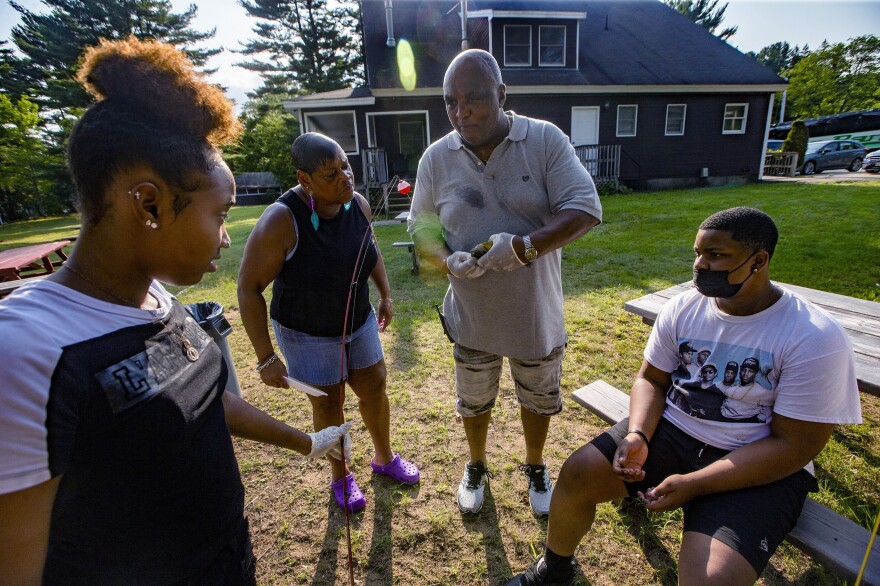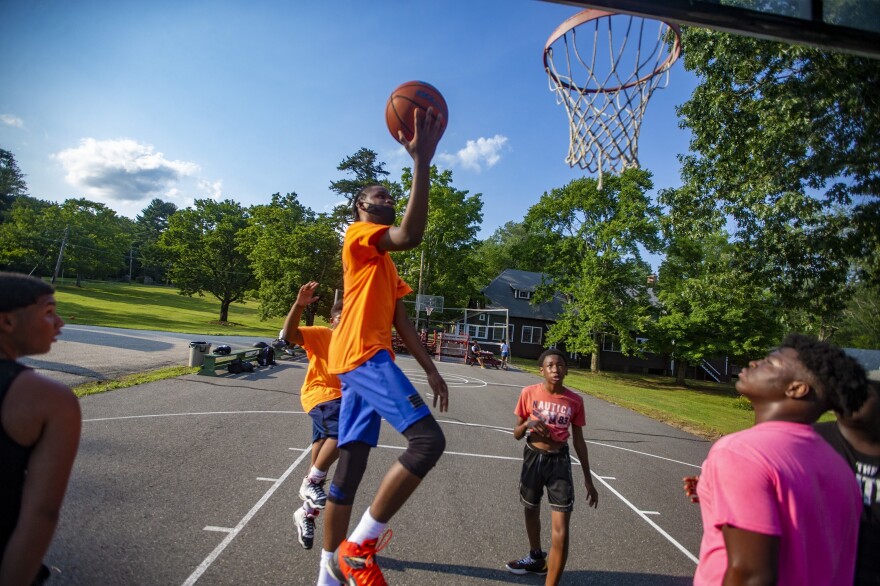The American summer camp wasn't originally intended for Black children.
But in the center of Massachusetts, on the shore of Lake Lashaway, there have been generations of Black kids frolicking in the bliss of the season at Camp Atwater.
On a Thursday in July, Olivia Auston, 16, and Alaysia Mondon, 14, were having a friendly competition of basketball.
When the camp was founded in 1921 by the Reverend Dr. William DeBerry, scholars believe it might have been the first of its kind in America — a summer camp specifically for Black youth.
Olivia said it's important that she spend time with kids who look like her.
"There's not much representation of Black people in Massachusetts. When you think of different cities, you think 'Oh, Massachusetts. Full of rich White people,'" she said. "But it's nice to have somewhere you can go and trust people and be around your own people."
Alaysia, whom Olivia met two years ago at camp, said she likes how Camp Atwater allows them to explore their individuality.
"We're obviously all different in our own ways," she said.
"Miss Speech Girl," Olivia teased.
They both laughed.
"I mean we can't all be the same or else it won't be fun," Alaysia continued. "So if we all had the same interests there'd be no point in doing all these activities."
The sleepaway camp for kids ages 8 to 15 was on hiatus last summer because of COVID. This year, it's a free day camp, two days a week for older vaccinated teens.
Whatever modicum of peace camp allows, is necessary, especially after the isolation and injustices of last year, said Henry Thomas III, who heads the camp.
"When you think about where the kids have been for the last year – emotionally, psychologically – it's been kinda rough," he said.
Thomas leads the Springfield Urban League, which manages Camp Atwater. He was a teen activist during the Civil Rights movement in the 60s – the same time he was a camper here.
"We used to have some dynamite discussions about Civil Rights, the movement, Black power," he said.
Being at the camp, Thomas said, fueled his fight for justice, because he felt he'd be protecting his fellow campers' dreams.
"When we'd finish playing ball, we'd sit down on the waterfront and we'd start talking," Thomas remembered. "They were saying, 'I want to be a doctor.' 'I want to be a lawyer.' "
And many of them did become doctors and lawyers.
Thomas pulled out a small piece of paper with handwritten notes and rattled off the names of famous former campers. Wayne Budd, the former U.S. Attorney for Massachusetts; "Rick" Ireland, the first Black chief justice of the Massachusetts Supreme Judicial Court; Donald Faison, an actor known for the show "Scrubs;" Ruth E. Carter, the Oscar-winning costume designer of "Black Panther;" and media mogul Wendy Williams.

Groundskeeper Buck Gee, who was a camper in the '70s and a counselor in the '80s, said the magic of Camp Atwater is the freedom it allows Black kids. They try not to have too many rules at this camp, because Black kids are policed everywhere else. And Gee says he remembers a time when kids would take canoes to an island on the lake and camp there.
"At night, you'd hear 'em singing and going back across [the lake] like Vikings," he said. "And man, you talking about noise all night, loud! They wouldn't sleep."
Camp Atwater, because of its longevity and purpose, is considered "historically anomalous" said Leslie Paris, an associate professor of history at the University of British Columbia. The camp is on the National Register of Historic Places. Paris said it played an important role in the Great Migration, when Black families moved from the South to metropolitan areas in the North.
"It provided opportunities to be away from the stresses of the cities, the racism of the city," Paris said. "It set apart spaces that were safe, that were welcoming."
Paris, who studies and writes about summer camps, said the first American summer camps didn't have Black kids in mind.
"The original child whom the first late 19th century camp proponents were imagining was a White boy," she said. "And their concern was about the boy's masculinity, his future leadership and sometimes also his spirituality."
Because Atwater was so unique, it attracted Black kids from around the country, especially from well-off families. Back then, Atwater also offered high-brow activities such as fencing and ballet and lacrosse.
"Sending one's child to Atwater was a sign of privilege," Paris noted. "It signaled, for parents and their children, a sign for making it."
But Camp Atwater's popularity waned in the 1970s, Paris said, partially due to the desegregation of other summer camps.
The American Camp Association, from where Camp Atwater receives its accreditation, doesn't keep a running list of camps like Atwater in the country. But there are a few known ones, such as Camp Founder Girls, which is a summer camp started in 1924 for Black girls in San Antonio, and the modernly-formed Black Lives Matter Utah Summer Camp.

At the end of campers' day at Atwater, most kids head to the bus to leave. But Joshua-Mark Campbell, 17, who just learned about the history of Camp Atwater, stayed behind on the basketball court to reflect on the importance of the Massachusetts camp a century after its founding.
"I'm kinda without words, because this is something you don't see very often, you know?" he said. "And when you spot it, it's a good thing. So yeah, it's awesome."
Next year, Campbell said he hopes so many kids find out about this "definitely important" place that there's a waitlist for Camp Atwater – where generations of Black kids have been free to be Vikings or just themselves.
Copyright 2021 WBUR


